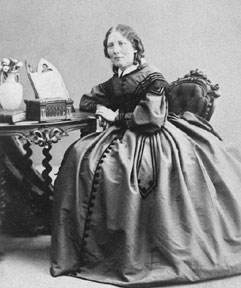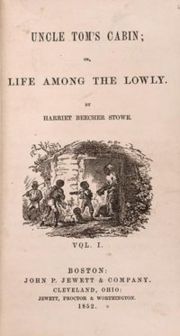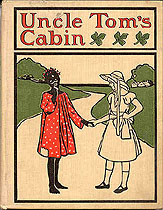Robin's Working Page
From 1850s
Contents |
[edit] Early Life
Harriet Beecher Stowe was born in Litchfield, Connecticut, the sixth child of a prominent Calvinist minister, Reverend Doctor Lyman Beecher and his wife Roxanna Foote. Harriet Beecher Stowe was named after another sister, Harriet, who had been born before her but died when only 1 month old. When Harriet was four years old her mother died of tuberculosis. Her family encouraged a highly religious and intellectual environment for their large family. As a young child she learned to read fluently, and loved to spend time in her father’s personal library perusing books. When harriet was almost six years old her father married his second wife Miss Harriet Porter. Harriet Beecher Stowe, like all her brothers and sisters, was raised to be strongly moralistic and religious. All of her brothers ended up working as clergymen like her father, and Harriet went on to marry a clergyman herself. Her family also had strong abolitionist tendencies. This religious and moral upbringing greatly influenced her life and her literary works to come.
[edit] Adult Life
In her adult home life she was a busy mother and wife. She married Calvin Stowe, a theology professor, and they had seven children together, though only three of these children survived them. She lost an infant son, Charley, to Cholera in 1849. The grief of the loss carried over into her writing, and you can see she channels this grief into the writing of Uncle Tom's Cabin and its predominant theme of a mother being separated from her child. Although Stowe was raised an evangelical Calvinist, she gradually grew to resist this faith in favor of Episcopalian beliefs. After her father's death and her move to Hartford in 1864, she joined the Episcopal church. When the Stowe family lived in Hartford for a time, Samuel Clemens' ( Mark Twain's) family lived next door and the two families became friends. Clemens was a generation younger than Harriet Beecher Stowe; he was about the same age as Stowe's twin daughters.
[edit] Career
When Abraham Lincoln met the author he joked, "So you're the little woman who wrote the book that started this great war." Harriet Beecher Stowe lived from 1811-1896 and was the famed author of Uncle Tom's Cabin. She published 30 other books in her 50-year career as well as numerous short pieces of writing. Her first book was a children’s geography book she wrote with her sister Catherine. Uncle Tom's Cabin was by far her most famous book, selling 10,000 copies its first week of its publication and becoming an international best seller of its day. She wrote novels, poetry and essays, and also wrote non-fiction books on a the subjects of homemaking and the raising of children, and religion. She began her writing career composing magazine articles and short stories, before she ever wrote a book. Uncle Tom’s Cabin, Her most famous novel, was pirated and in 1852, one and a half million copies of the book were sold in England and British colonies. Eventually the book was translated into nearly 2 dozen languages. In the process of writing this book, she created much controversy within the Union as peoples sympathies were ignited by this story and the slavery issue became even more volatile. Writing Uncle Tom’s Cabin, she accessed memories of the stories that she had heard from slaves and stories that she had heard elsewhere about slavery. She made the separation of mother and child through slavery one of the central themes in the book, accessing her pain from losing her infant son and channeling it into one of the most heart-wrenching emotional themes of the novel. After this book was published, her fame brought her literary sucess. She published her writings in The Atlantic Monthly and in the Independent and in Christian Union. For a period of time she was the most celebrated female writer in The Atlantic Monthly. Stowe had the opportunity to make several visits to Europe, where she met and befriended George Eliot, Elisabeth Barrett Browning, and Lady Byron. An unfortunate career twist occured when she wrote Lady Byron Vindicated (1870), accusing Lord Byron of having incestuous relations with his half-sister. After this, British public opinion turned against her and the magazine Atlantic, where the text first appeared also suffered. Attacks on her portrayal of the South in Uncle Tom’s Cabin led her to publish The Key to Uncle Tom’s Cabin in 1853, where she published her source material for the novel. She also published a second anti-slavery novel, Dred: A Tale of the Great Dismal Swamp in 1856. This book told the story of a dramatic attempt of slave rebellion. After the Civil War, the sales of the novel declined. Initially, people seemed to look over the faults of the book in favor of its underlying message, but as time went on, the sentimentality and religiosity of the story was considered to be to its detriment. A film adaptation of the story was made in 1903. (include youtube link here) The phrase ‘Uncle Tom’ went on to be used negatively, meaning undue subservience to white people on the part of black people. Stowe’s later works never gained the same popularity as Uncle Tom’s Cabin. She published books, essays and a small number of religious poems. She died on July 1, 1896 in Hartford, Connecticut.
[edit] Historical Perspective
Living in Cincinnati for a time, Stowe was very close to the border of a neighboring slave state and came into contact with fugitive slaves and vicariously learned about southern life. These experiences combined with the passage of the Fugitive Slave Act prompted her to write Uncle Tom's Cabin in 1852. This book was first published serially in the antislavery paper National Era. Uncle Tom's Cabin is said to have contributed to the outbreak of the Civil war because it brought slavery to the attention of Americans in a way that created a lot of conflict and emotional turmoil in readers. It was written in a way that shed critical light on the practices of slavery and showed compassion towards slaves, viewing them as humans who deserved empathy. While living in Ohio, the Stowe's sheltered fugitive slaves in their home. She wrote Uncle Tom's Cabin in the wake of the Fugitive Slave Law of 1850.
[edit] Uncle Tom's Cabin
Her most famous novel was pirated and in 1852, one and a half million copies of the book were sold in England and British colonies. Eventually the book was translated into nearly 2 dozen languages. In the process of writing this book, she created much controversy within the Union as peoples sympathies were ignited by this story and the slavery issue became even more volatile. Writing Uncle Tom’s Cabin, she accessed memories of the stories that she had heard from slaves and stories that she had heard elsewhere about slavery. It is reported that she never actually visited the South and received some criticism for basing a book on a subject in which she was not intimately acquainted. She made the separation of mother and child through slavery one of the central themes in the book, accessing her pain from losing her infant son and channeling it into one of the most heart-wrenching emotional themes of the novel.
for more reading:
http://www.harrietbeecherstowecenter.org/life/ http://www.online-literature.com/stowe/ http://www.greatwomen.org/women.php?action=viewone&id=154 http://www.pinn.net/~sunshine/whm2001/stowe.html http://www.iath.virginia.edu/utc/sitemap.html http://www.iath.virginia.edu/utc/uncletom/uteshbsbt.html http://www.iath.virginia.edu/utc/uncletom/uteshbsct.html http://www.iath.virginia.edu/utc/interpret/exhibits/winship/winship.html http://www.kirjasto.sci.fi/hbstowe.htm
Harriet Beecher Stowe biography available online
see this video http://www.youtube.com/watch?v=g7ZrUZOOwxI




